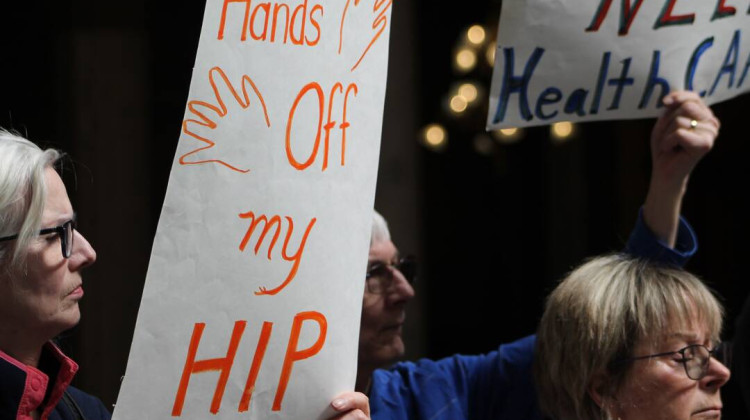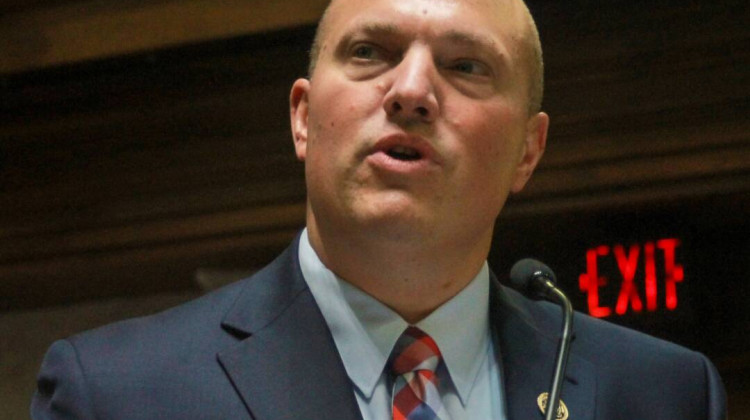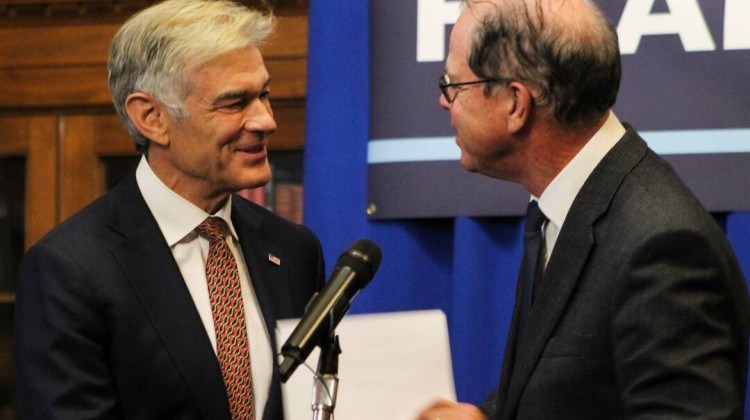
Most businesses throughout Indiana are able to fully reopen if they choose. While Stage 5 lifts capacity limits on businesses, bars and restaurants still face other restrictions.
Lauren Chapman/IPB NewsThe Indiana State Department of Health reported 73 additional confirmed deaths over the last week, bringing the state’s total to 3,354. The state announced more than 117,000 total confirmed cases – including two days with more than 1,000 reported cases – and more than 1.3 million Hoosiers tested.
Here are your statewide COVID-19 headlines from last week.
Gov. Eric Holcomb Lifts Almost All COVID-19 Restrictions
Gov. Eric Holcomb announced Wednesday he’s lifting almost all of Indiana’s COVID-19 restrictions.
The state moved to its final reopening phase on Saturday, with one big caveat – the statewide mask-wearing order remains in effect.
Holcomb said Indiana’s COVID-19 numbers are trending in the right direction. But he still urged businesses, bars, restaurants and individuals to exercise caution, even as he lifts capacity limits.
“Physical distance between us, if we’re around other folks we’ve got our mask on, we have different schedules – really creative measures being implemented right now all over the state of Indiana,” Holcomb said.
There are still a few limitations. Bar customers must be seated and both bars and restaurants must enforce social distancing. And events with more than 500 people must get approval from the local health department.
Indiana Lifts Capacity Restrictions In Stage 5, But Restaurants Still Face Limitations
Most businesses throughout Indiana are able to fully reopen if they choose. While Stage 5 lifts capacity limits on businesses, bars and restaurants still face other restrictions.
The final step keeps the mask mandate in effect, bar patrons must be seated and social distancing is expected to be practiced.
Indiana Restaurant and Lodging Association President Patrick Tamm said while lifting capacity restrictions is good news, restaurants still face limitations.
“While the governor allows us to move the Stage 5, we still are required for social distancing,” said Tamm. “So we're not truly at 100 percent occupancy. But he does clearly give us the ability in some cases, depending upon our floor plans and how things are laid out, to try to maximize the best we can.”
Statewide COVID-19 Testing Set To Begin Third Phase, Include Children
The Indiana State Department of Health and IUPUI will begin the third phase of its COVID-19 tracking study on Sept. 29. This round of the study is set to include children as participants for the first time.
The tracking study aims to help health officials find out current and past COVID-19 infection rates. The study includes both nasal swabs to test for active infections and blood tests to test for antibodies. Participants 12 years and older will be asked to provide both samples, while children between the ages of 5 and 11 will only provide the nasal sample.
Participants invited to participate in the study will be contacted via text message, phone call or postcard, and encouraged to schedule a test at a designated testing site through the state website to register.
Nir Menachemi with the Richard Fairbanks School of Public Health at IUPUI said adding children as participants in the third phase of the tracking study is important in helping understand how far the virus has spread into communities.
“The addition of children is really to get a snapshot, for the first time, of people under the age of 12, who had been previously excluded, to see what proportion of children are currently infected in the state,” Menachemi said.
As Schools Re-Evaluate, Teachers Say Remote Learning Is Burning Out Staff And Students
Many of Indiana's school leaders are grappling with tension in their communities as they consider how and when to bring more kids back into schools, but teachers say they're feeling more pressure than ever to manage classes in-person and online, as well as their own safety.
Most schools in Indiana started the new academic year with some sort of in-person instruction, but teachers say the so-called "hybrid" learning models are burning them out – fast.
Crawfordsville High School teacher Emily Race said her school is bringing most students back for in-person learning this week, but with some kids still learning online from home because of quarantine or safety concerns, she's not feeling any relief.
"So the only real change is that I have to create new seating charts to try to space out twice as many students in the same physical space," she said.
Race says many teachers are working into the evening and over the weekends just to keep up.
Indiana Officials Share First Look At School COVID-19 Case Dashboard
Preliminary data shows schools across Indiana reported nearly 1,900 total cases of COVID-19 among staff and students.
Indiana officials unveiled the early numbers Wednesday, to preview the school COVID-19 data dashboard set to roll out publicly this week.
State leaders say the data comes from about 70 percent of Indiana schools that have so far submitted information. About 700 new cases were reported the week of Sept. 14.
Hoosier Voters Can Sue To Extend Poll Hours On Election Day After Judge Halts Law
Hoosier voters will be able to go to court this fall to ask for polls to stay open longer if there are problems on Election Day.
A federal judge halted an Indiana law that would’ve barred voters from asking a court to extend polling hours.
A 2019 state law barred anyone from suing on Election Day to keep polls open longer if problems arose – except for a county election board. And even then, the law said those bipartisan boards must vote unanimously to bring the request to a judge.
The law also limited a judge from deciding why poll hours should be extended – they could only do so if the polling place failed to open on time or shut down during the day.
Advocacy group Common Cause Indiana sued, arguing the measure could make it harder for some Hoosiers to exercise their constitutional right to vote.
Indiana Vote-By-Mail Advocates Look Ahead To Continued Fight
Barring a last-minute curveball from the federal courts, Indiana will be one of only four states without expanded vote-by-mail for the 2020 general election, amid an ongoing pandemic.
But advocates haven't given up on the fight – and they say they'll use everything that happened this year for a renewed push in the debate.
READ MORE: Can I Vote By Mail? Here's What You Need To Know For Indiana's Elections
Join the conversation and sign up for the Indiana 2020 Two-Way. Text "elections" to 73224. Your comments and questions in response to our weekly text help us find the answers you need on COVID-19 and the 2020 election.
Gov. Eric Holcomb declared a public health emergency over COVID-19 on March 6. Two weeks later, before he issued an expansive “Stay-At-Home” order, Holcomb postponed the primary election from May to June. And the Indiana Election Commission expanded the state’s vote-by-mail system, allowing any eligible voter to cast their ballot that way for the primary. That was done in agreement with the Indiana Republican and Democratic Party leaders and Secretary of State Connie Lawson.
“All of these steps will be in concert to ensure that our election process will continue and that every eligible voter is given the opportunity to vote,” Lawson said.
People took advantage – more Hoosiers voted absentee than on Election Day.
A few months later, things have changed.
More Unemployed Hoosiers Report Problems Being Fixed
Indiana is making progress getting state unemployment benefits to those who qualify for it.
Many people who were waiting on the state to verify their eligibility for unemployment benefits reported them being resolved last week. Others said they even got an extra $300 Lost Wages Assistance payment a few days earlier than expected.
DWD Chief of Staff Josh Richardson says as new claims for state unemployment benefits decrease, they’re able to allocate more staff to resolving eligibility issues with federal benefits from the CARES Act.
“It’s just a confluence of factors,” he said. “We’re six months in, we’ve learned a lot about it. Obviously claims volumes are going down, the unemployment rate is getting lower, so all those things are combining I think to have some effect.”
$25 Million More Goes Towards Free Job Training For Hoosiers
Indiana officials said they’re allocating an additional $25 million from the CARES Act towards the state’s Next Level Jobs program. The program offsets the costs of certain types of training for workers and employers.
Since the state launched its Rapid Recovery plan in June, more than 5,000 workers signed up to take classes, paid for by the state, at places like community colleges. Just more than half already completed their training and got a certification that helps at work.
Pandemic relief measures have temporarily widened the program’s scope until the end of the year, allowing those with college degrees to get training paid for. The program also covers more classes than before.
More than 600 employers have also used funding from the Employer Training Grant side of Next Level Jobs to train new or existing workers for jobs. Relief measures increase the maximum an employer can be reimbursed for training from $50,000 to $100,000.
Indiana Expands Small Business COVID-19 Relief Program
Indiana is expanding a small business COVID-19 relief program after it struggled to get many Hoosier businesses to apply.
The Small Business Restart Grant program uses $30 million from the federal CARES Act. But, since June, the state only sent about $1 million out.
That’s in part because small businesses who received other federal COVID-19 relief funding were ineligible for the state’s grants. New changes to the program removed that barrier – businesses that accessed federal support like the Paycheck Protection Program can also get Restart grants.
The program, which was set to end Sept. 30, will also now run through Nov. 1 for Marion County businesses and Dec. 1 for all other counties.
Contact Lauren at lchapman@wfyi.org or follow her on Twitter at @laurenechapman_.
 DONATE
DONATE






 Support WFYI. We can't do it without you.
Support WFYI. We can't do it without you.